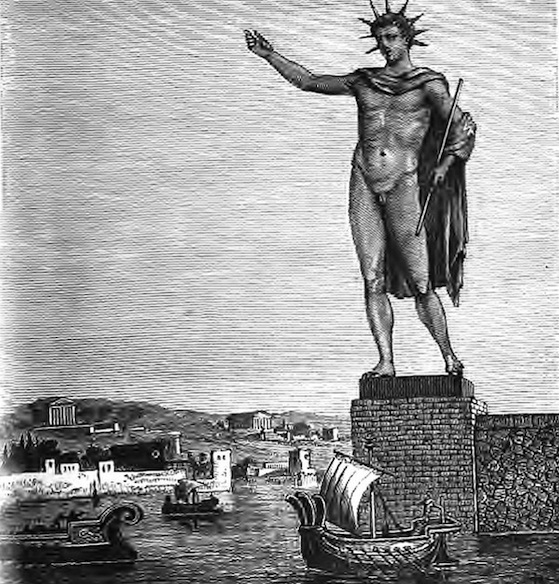 Helios, the sun god of ancient Greece could help Greece get out from under.
Helios, the sun god of ancient Greece could help Greece get out from under.
Here’s a surprise twist. The economic woes in Europe due to Greek debt may result in Greece supplying huge amounts of cheap solar power for Europe, by way of paying back its debts, but in the process creating rivalry with Desertec, the visionary plan to supply 15% of Europe’s energy from the deserts of the MENA region. Greece is in the process of arranging financing for a gigantic 10,000 megawatt $30 billion solar project that could be its ticket out of its financial woes.
The solar project, named Helios (the ancient Greek god of the sun) would just lay around and soak up gorgeous Greek sunshine and spit out free electrons for 25 years. The staggering amount of revenues generated would be used to pay down its debt.
Truly God-like – Helios would be a simply gargantuan 10 GW solar power project, vastly dwarfing any solar energy project on the face of this earth, ten times larger than the entire world capacity of solar thermal power plants in current operation. Such a huge project would create $22 billion worth of electricity every year, and $120 billion worth of electricity over the next 25 years. Greece’s entire economy is $300 billion.
The catch? The project is not yet built, or even financed yet. But that is not stopping Greece’s creditors from mulling the option.
According to the EU: “Greece would commit future cash flows from project Helios, or other privatisation revenue in excess of those already included in the adjustment programme, to further reduce indebtedness of the Hellenic Republic by up to 15 billion euros with the aim of restoring the lending capacity of the EFSF” (European Financial Stability Fund).
A meeting in December may decide whether this novel, surprising and somewhat outlandish idea to repay debts by borrowing to finance a yet unbuilt solar power project could work, given that Greece has been very late to join the EU renewables party.
For the MENA region, the decision has major implications, since the same German investors who would be called on to switch gears to get the power from within Europe are already moving decisively on a rival gargantuan proposal, Desertec, that will tap the highest insolation values in the world from vast deserts south of the Mediterranean to ship power to Europe. The first power plant to supply the project, a half GW solar power plant in Morocco, is beginning next year. (Desertec Begins: 500 MW Moroccan Solar in 2012)
If Greece, which does have very significant solar and wind resources, is tapped to provide such a vast amount of power to Europe to repay its investors, the arrangement would likely impact the interest in tapping the more distant deserts of Morocco, Egypt and other MENA nations for Europe’s power.
Related stories:



DESERTEC – Oh great! Another economic lifeline and tether to Mid East countries, because we all know how politically stable that region is, not to mention the vast economic blackmail potential.
The idea here to create prosperity, stability and sustainable growth so communities can rise up and become healthy and happy.
Haha! Yes, precisely! It would be terrible if the potential Desertec funding from Germany had to go there, when the real deal of Desertec is ready to go.
Isn’t DESERTEC goal is to have a network of Wind, Solar and Hydro all over North Africa AND Europe? I think this is smack in the middle of Desertec plans, though the competition for who gets funds first might heat up.
Greece is sunny yes, but it’s too densely populated and hilly to offer the right kind of real estate that CSP needs, isn’t it? The right locations will have to be purchased at a premium, locals and farmers will be hard to win over or there will have to be serious damages to natural habitats, All of it adding to the cost. I think that roof top solar panels and wind might be the way to go for Greece.